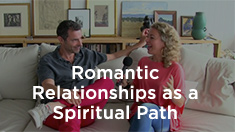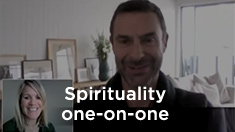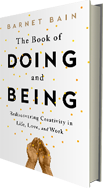Conversation with Barbara Marx Hubbard
Barbara: Because it’s conscious evolution – it’s not unconscious now. So the awakening feminine postmenopausal – as also the mentor of all the younger women – is a signal of the evolution of our species, I believe.
And I also know that from my own experience…every man who’s ever really loved me was–had a very hard time with the degree of vocational arousal I have. And I would say most of them couldn’t stand it. So, there is in the heart of the postmenopausal or evolutionary woman of any age – but let’s say the body, because it no longer has the eggs – like my fun phrase is, “We have no more eggs, we are the egg.”
Barnet: Mm-hm.
Barbara: And we haven’t seen ourselves before. We have not seen the fulfillment of the authentic feminine, within the chrysalis, at the time of a planetary birth experience for our entire planet going through some form of metamorphosis – that this cultivation of this quality of being of the feminine could be absolutely essential. And what I have noticed about myself and every other evolutionary woman, regenopausal woman, is that we all long for the evolutionary men. And it’s not that we necessarily want to marry them. We don’t even want to marry anybody. I mean, I’m speaking generically. But we want the fusion of genius. We want the intimacy of co-creation. It’s not exclusive; it’s not possessive. But it’s totally creative. And it’s joyful. And it feels like falling in love. But it’s not a possessive, romantic love.
And I began to feel it for Barnet. [laughter]
Barnet: Mm-hm.
Barbara: And I began to wonder what is it? Because it’s so enjoyable to be with you. And there’s something that comes from you that then – and just as we were preparing for this, I was on his radio show today – was that part of it is the art form of co-creation and joining genius with evolutionary man and evolutionary woman and postmenopausal woman and older man, for that matter. And are we at the threshold of one of the greatest new love affairs of the human species?
Barnet: Absolutely.
Barbara: So I want to ask you, Barnet, that if you could go with me into the feeling that the woman has.
And I’m going to make one more point because it’s really a juicy point. And I hope you will respond to it. This has to do with sexuality. And I had a partner who was very sexually attracted. And I was trying to get him to be more supra-sexually attracted. And so I came up with a really funny idea. So, the idea is called: The Plight of the Lonely Sperm. [Laughs]
Here’s the lonely sperm thought of the Regenopausal woman with whatever the man is. The woman has one egg at a time, and then now she has no more eggs. And if she still has eggs she doesn’t most of the time want to have a pregnancy, whereas the man has billions of sperm. And he keeps having billions of sperm. And he’s designed to inseminate everything in sight. Whereas the woman, when she’s having babies, when she gets pregnant she’s not able to keep getting pregnant until so she has the baby, nurses the baby, and cares for it.
So I began to even conceive that the Regenopausal woman and the man, if there is to be intimate love that the sexuality itself evolves into a form of regeneration. The woman doesn’t want a new baby, but she might want a new body. [Laughs]
Barnet: And she wants that co-creativity. As you said – she yearns for the idealized feminine – and yearns for the idealized man. That is that longing, that is that conception and perception that is the seminal – I’m mixing my metaphors – seminal energy of all creation. And we live in a time when there are spiritual traditions that discourage desire and longing.
Now, I understand discouraging greed, and avarice, and lust…
Barbara: Yeah.
Barnet: But we’re not talking about that. We’re talking about the primal urge to unite and to create space in order for it to be filled by works.
Barbara: Okay. I want to ask you, then, a specific question. We’re not only imagining – we are in the chrysalis. I mean, this is amazing. And I am an evolutionary woman expressing this. And asking you, Barnet, as a man in relationship to your own creativity and to your own relationship – I know you have a 30-year marriage, you have children, I have five children and eight grandchildren. So, but I want to know specifically what you experience, if you want to call yourself an evolutionary or evolving masculine, in the chrysalis, in the time of metamorphosis?
Barnet: I hope that everybody listening will take this and hear this because this is often ‘charged’ language. I hope that you will slow down your responses, again, and hear this in the way that I’m using it.
I am exploring my relationship to the erotic. And in that sense, our relationship is highly erotic. It’s not sexualized, but there is that play, a very refined level of integrity, of space making. In a way that is a dance back and forth, of space making and space filling.
This is very brittle language next to the juiciness of eros. And unfortunately the eros collapses into logos. But there is a play, and there is a collegial quality, and there is an exploration that happens. And spaces are created for each other, and with each other, and they amplify, and they build upon each other – and then thoughts, ideas, function, words, and projects sometimes, they begin to fill those spaces. And there is an ecstasy that happens there.
Barbara: This is so – that’s the joining of genius, instead of the joining of genes.
Barnet: Yes, supra-genes. It’s from genes to genius.
Barbara: Yes! And genius is your creativity, my creativity, the creativity of the people on this–
Barnet: Yes.
Barbara: Because we’re going to open this up for discussion very, very shortly.
Barnet: It’s the creativity that is fully present – fully, fully present with imagination and desire and expectation and inviting it, invoking it. You have the intention, when you talked earlier about having a certain kind of intention and then being willing to open to it, the intention is to put on the afterburners. What makes life juicy is the erotic life of vital and vibrant imagination. And eventually, these moments of imagination they become so alive that they begin to imagine themselves. Then we go on a wild ride.










